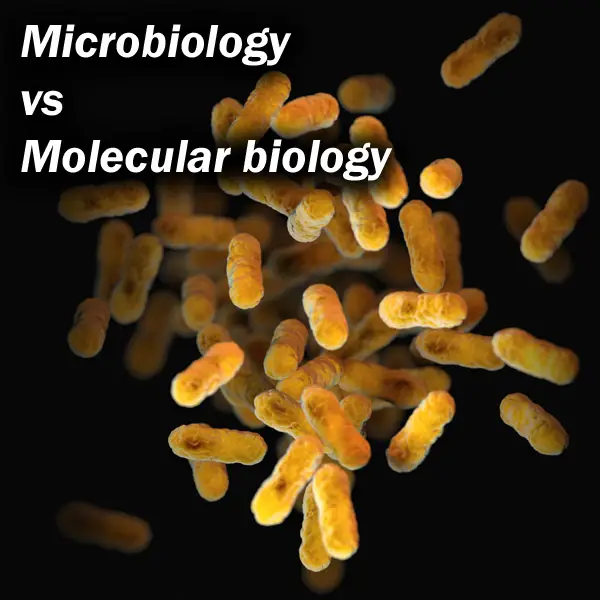Biology as a branch is a huge field of study and therefore it is divided into many branches that deal with different areas of study. Microbiology and molecular biology are two such fields of study.

So what’s the difference between microbiology and molecular biology?
Microbiology is the field of science that deals with the study of microorganisms like bacteria, viruses, fungi, prions, and Protozoa. On the other hand, molecular biology deals with the study of the molecular basis of the cells, especially the study of DNA and proteins.
Macromolecules are the heavy molecules within a cell. DNA, RNA, proteins, lipids, and carbohydrates are the macromolecules, and molecular biology studies the interaction of these macromolecules inside a cell and the various processes they are involved in. Things like the location of a gene on a specific location of a chromosome, the synthesis of specific proteins, and what they all do— all come under molecular biology. There are many modern techniques of molecular biology that we currently use in various fields of study.
Some of these techniques are:
- PCR (polymerase chain reaction)
- Various blotting techniques (Western, Southern, Northern, Eastern blotting)
- Microarray techniques
- Probing
- Gel electrophoresis
- Allele-specific oligonucleotides.
From a medical point of view, molecular biology helps understand the molecular and genetic basis and diagnosis of various diseases. Additionally, newer methods of treatment like gene therapy also use molecular biology methods to treat specific conditions. For example, Zolgensma is a gene therapy medication for spinal muscular atrophy (SMA)— an incurable condition previously can now be treated with this gene therapy. Although affordability is a big issue in gene therapy currently, it is a great achievement that was possible because of molecular studies of the cells.
Microbiology on the other hand deals with the organisms that can only be seen under the microscope. It deals with studying the structure of an organism, its behaviour, its survival methods, its mechanism of pathogenicity, reproduction, mutations, etc. Microbiology is an essential branch to understanding any organism and plays a very important role in understanding the behaviour of an organism inside and outside the host’s body and how it may cause disease— making it an essential branch for medicine and research.
Is Molecular Biology Harder Than Microbiology?
Whether molecular biology is harder or not is a subjective matter. At the end of the day, it all comes down to the basics and the interest to learn. Microbiology is way more vast though and will require knowing molecular biology and cellular biology aspects as well.
In simple terms, microbiology is a vast subject, whereas molecular biology is a very niched branch of biology. The application of molecular biology is in both microbiology and biochemistry.
Learning and remembering various steps in the molecular processes can be a tedious job. Since it requires a lot of memorization of various pathways and processes, people who are not that great at memorization might find it challenging. But the same is the case with microbiology. A lot of memorization is required in this branch as well. However, if you have an interest in either of the subjects, this is something you’ll learn to enjoy and is not a deal breaker.
Microbiology is a vast branch and you’ll have to touch on molecular and cellular biology, in addition to other aspects of the various microorganisms, like their pathogenicity, life cycle, reproduction, culture, reactions they cause in a lab setting, differences between various species of organisms, etc. You may find some parts of microbiology easy and some challenging.
So, speaking in terms of which is harder— microbiology is harder than molecular biology. This is because you’ll have to study a lot of individual microorganisms (bacteria, viruses, Protozoa, prions, fungi), their various species under a genus, their similarities, their differences, how to grow them in the lab, what reactions they cause, and a lot more. It’s a much more bulky branch when compared to molecular biology.
In terms of picking the branch as a field of study, it’s better to keep in mind what kind of career is desired. Both microbiology and molecular biology will allow you to work in a lab. So, taking a few classes in each might help you figure out whether you enjoy learning about microorganisms as a whole or if you are interested only in the molecular and genetic aspects of cells.
Which has a brighter future: Microbiology or Molecular Biology
Molecular biology is a relatively newer branch of biology and has a lot of possible applications that need to be explored, especially in the field of research, pharmaceuticals, and medicine. So, the future of molecular biology is pretty strong.
That said, microbiology is going to be around too. Its applications are in the field of medicine, pharmaceuticals, and research as well. We are always going to share this planet with microorganisms and that makes microbiology an essential field of study to understand the good, the bad, and the ugly of these microscopic organisms.
In the most recent turn of events, microbiologists quickly studied the coronavirus (SARS-CoV- 2) involved in the COVID-19 pandemic. Based on their findings the origin, pathogenicity, infectivity, how they cause infection, and the mutations were understood. It was based on microbiological and molecular findings rapid development of vaccines was possible.
With the advancement of technology, it is expected that molecular biology studies and techniques may become a more commonly used method for understanding various diseases and even for treatment. That said, both microbiology and molecular biology are essential branches of science and both have bright futures.
Is Molecular Biology Same As Biochemistry
No, molecular biology is not the same as biochemistry. However, molecular biology has applications in biochemistry. Just like microbiology, there is some overlap.
Biochemistry is a broad subject, just like microbiology. It deals with the chemical processes that occur in any cell/organism. For example, how the metabolism of various macronutrients happens, the synthesis of proteins, the breakdown of nucleic acids, chemical processes behind the survival of any cell, biochemical changes/differences in different disease conditions, etc. Biochemistry is a broader field of study, and molecular biology has some applications in it.
Cell Biology Vs Microbiology
Microbiology is the study of microorganisms. On the other hand, cell biology is the study of cells irrespective of species (plants, animals, microorganisms). The structure of the cells and the various mechanisms that occur in the cell as a whole are studied in this branch of biology.
Cell biology is again a niched-down branch of biology when compared to microbiology.
Microbiology Vs Molecular Biology Salary
As per the US Bureau of Labor Statistics, the median salary of a microbiologist is around $79,260 per year. The range is usually between $47,000 to $136,000– depending on the experience level.
There is no such data available for the salary of molecular biologists from the government. But unofficially, the average salary of a molecular biologist is around $63,000 per year, and ranges between $45k to $95K per year, depending on experience.
Microbiology Vs Molecular Biology: What You Should Remember
Microbiology is the study of microorganisms, whereas molecular biology deals with the DNA, RNA, and proteins within the cell. Both molecular biology and microbiology are interesting fields of study. Both have applications in the field of medicine, research, and pharmaceuticals, and therefore both have a good future in terms of scope.
You can see in the following video what molecular biology involves:
You can see the following video to get an idea of how microbiological studies are done:
Click on the following link to learn about histology vs pathology; their similarities and differences.
